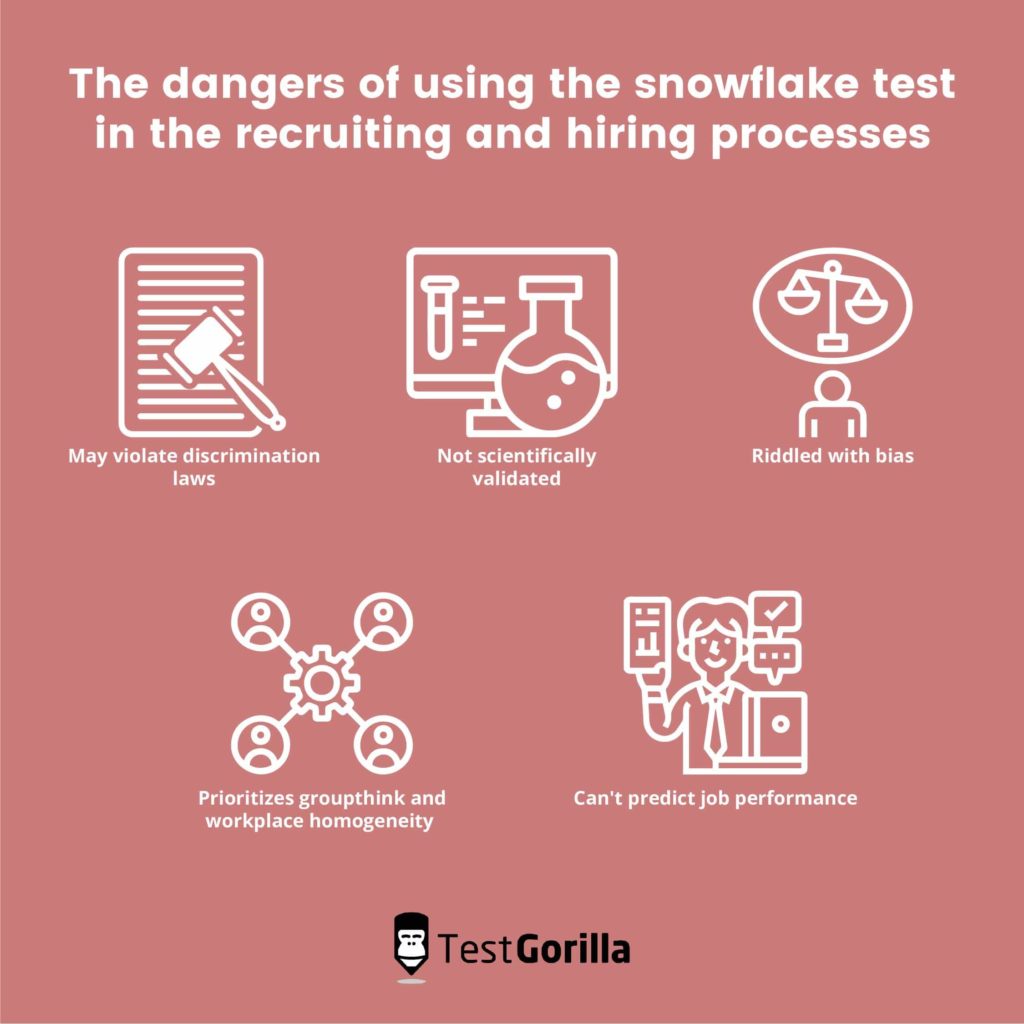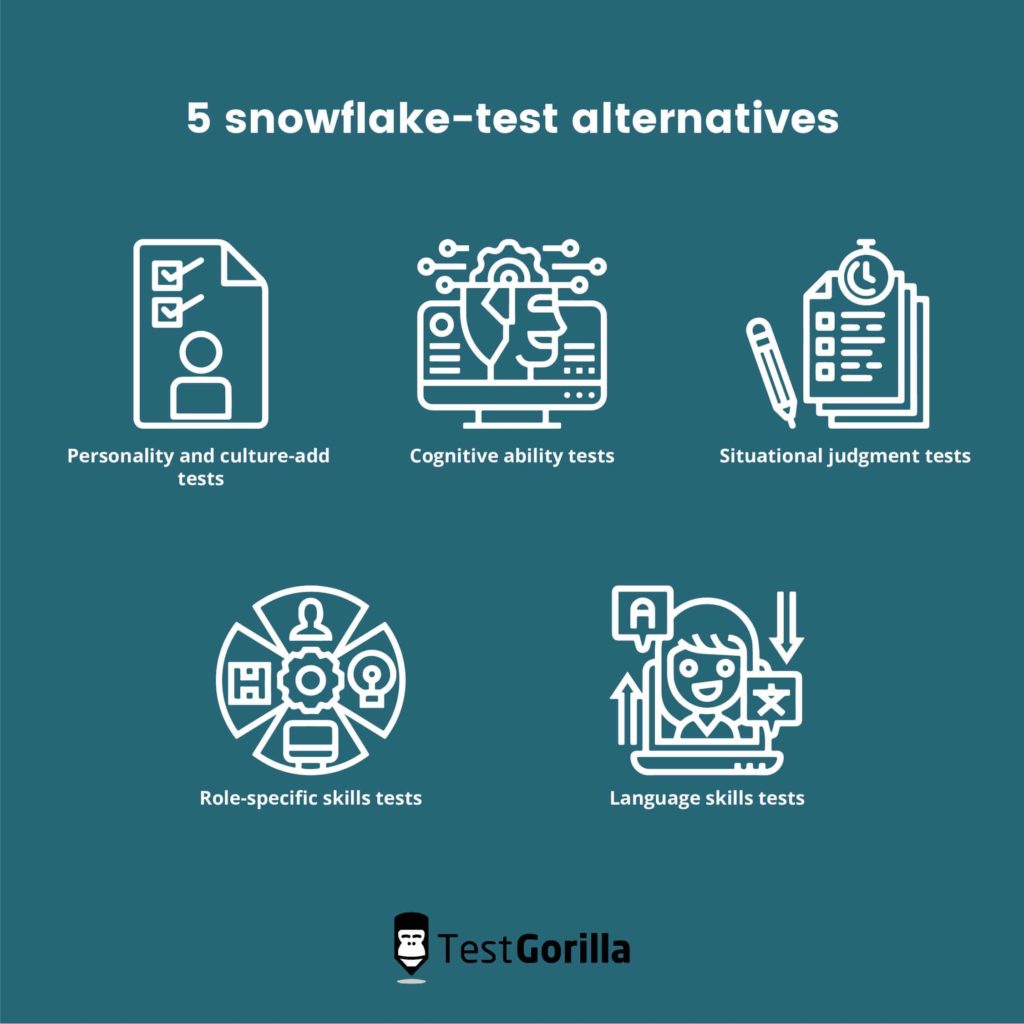Way back in 1996, Chuck Palahniuk penned the following phrase in his book Fight Club: “You’re not a beautiful and unique snowflake.” Although he intended to enforce the notion that no one person is more unique or special than the next, the word “snowflake” has come to be used as a modern and derogatory description for the millennial generation.
In a hiring context, the “snowflake test” has been making the rounds as an alternative personality and culture test intended to rule out applicants deemed to possess certain “snowflake” characteristics.
Here, we’ll explore what the snowflake test is, how it came to be developed, and why you should never use it as a part of your recruiting and hiring processes.
Table of contents
What is the snowflake test?
The snowflake test is a personality and culture test that contains a series of questions designed to ascertain if a job applicant has the same views, beliefs, and political opinions as the rest of the employees at the company. In other words, the test tries to establish if a candidate can be considered a “snowflake” and, therefore, not a good fit for the firm.
The test questions were designed by Kyle Reyes, the chief executive officer of the marketing agency The Silent Partner Marketing, after a video of his company went viral and his business was then flooded with resumes from hopeful candidates.
Claiming that he didn’t want “most people to work for [his] company,” Reyes intended to use the test’s questions to not only sift through resumes quicker but also weed out “whiny, needy, entitled little brats.”
What topics do the snowflake test questions cover?
Kyle Reyes published the original 30-question snowflake test on his personal Facebook page in 2017. Many of the questions are designed to draw out an applicant’s political, ethical, and religious views and beliefs, as well as their opinions on “typical snowflake” language.
Below are 20 of the original snowflake-test questions, taken directly from the original Facebook post:
How many sick days should be given to employees?
How do you feel about guns?
What are your feelings about employees or clients carrying guns?
Should “trigger warnings” be issued before we release content for clients or the company that might be considered “controversial”?
How do you feel about the police?
When was the last time you cried and why?
What are your thoughts on the current college environment as it pertains to a future workforce?
What’s your typical breakfast?
What do you do if a coworker comes to the table with an idea and it sucks?
What does the First Amendment mean to you?
What does faith mean to you?
You’re in Starbucks with two friends. Someone runs in and says someone is coming in with a gun in 15 seconds to shoot patrons. They offer you a gun. Do you take it? What do you do next?
What does America mean to you?
You see someone stepping on an American flag. What do you do?
What does “privilege” mean to you?
You arrive at an event for work and there’s a major celebrity you’ve always wanted to meet. What happens next?
How do you handle bullies?
What are your feelings about safe spaces in challenging work environments?
Outside of standard benefits, what benefits should a company offer employees?
What should the national minimum wage be?
The dangers of using the snowflake test in the recruiting and hiring processes
Although Reyes developed the snowflake test as a way to sort through resumes quickly by pinpointing applicants who would fit his company’s culture, the test is inherently problematic.
Let’s explore why the snowflake test is an unsuitable and dangerous pre-employment test to use during the hiring process.
1. The snowflake test may violate discrimination laws
The snowflake test raises several red flags. Reyes uses applicants’ answers to the test questions to automatically disqualify candidates who aren’t staunchly conservative, pro-American, and in favor of the Second Amendment.
However, under the laws enforced by the US Equal Employment Opportunity Commission (EEOC), it is illegal to discriminate against job applicants or candidates based on their race, color, religion, sex, sexual orientation, national origin, age, disability, or genetic information.
Under the same laws, pre-employment tests can be used as long as they are not designed or intended to discriminate against people with any of these characteristics, and they must measure qualities that are “job-related”.
Most of the answers to the snowflake-test questions are likely to pertain to (or can be perceived to pertain to) some of the characteristics listed, so, the snowflake test immediately raises doubts as to whether disqualifying a certain applicant based on the test’s results is legal.
2. The snowflake test is not scientifically validated
Pre-employment tests are only useful tools in the hiring process if they have been scientifically validated. The snowflake test, however, was developed by just one person, appears only to reflect his personal beliefs, and has no scientific basis to support the validity of its results.
Rather, the results serve to exclude applicants based on their political, ethical, and religious beliefs alone. Scientifically, the test results have little to no relation to applicants’ job-related abilities.
Legitimate pre-employment testing organizations pride themselves on scientifically-backed tests that have been proven to assist companies in making hiring decisions. Such testing organizations are also committed to continuously improving the quality of the tests available.
3. The snowflake test is riddled with bias
Reliable pre-employment tests are free of bias. In contrast, the snowflake test is unapologetically biased by design. Bias in the hiring process can lead to unsuitable hires, wasted hiring budgets, and time wasted on refilling open positions.
So, although dependable pre-employment tests can reduce bias in the recruiting and hiring process, since the results provide solid quantitative indicators of candidates’ suitability for open roles, the snowflake test only serves to reinforce the existing conscious biases of those administering the test.
4. The snowflake test prioritizes groupthink and workplace homogeneity
Hiring the same type of people over and over again – especially those who look and think just like you – is a huge no-no.
You can often do this unintentionally since unconscious bias leads to having a preference for one candidate to another, based on whether they have the personal qualities you identify with. You can also unconsciously disregard candidates because they don’t possess these qualities.
Bias in the hiring process leads to a lack of workplace diversity and fosters a culture of groupthink. And yet, diverse workplaces have been shown to consistently enjoy more innovation, improved cultures, and larger profits than less diverse ones.
Instead of trying to eliminate unconscious bias in hiring processes, the snowflake test reinforces conscious biases, which leads to high levels of groupthink. Instead of helping you to embrace the benefits of culture add, relying on the snowflake test will ultimately lead to poor decision-making and a lack of honest communication in the workplace.
5. The snowflake test can’t predict job performance
Another glaring problem with the snowflake test is that none of the questions is related to experience, skill, or potential job performance.
Culture tests can be useful in assessing applicants, but only when the results are combined with those from other tests (such as cognitive ability tests and role-specific assessments) to form a diverse evaluation of each candidate. This helps you better understand your candidates as a whole, rather than only assessing their opinions on topics related to your personal beliefs.
Simply put, seeking your candidates’ opinions on the topics covered in the original snowflake test cannot predict their job performance. The only thing it can do is determine how similar their personal beliefs are to your own.
5 snowflake test alternatives
The snowflake test is charged with conscious bias and is a highly unreliable method of pre-employment testing, but pre-employment testing is still the most effective way of screening candidates.
Just as culture add and personality types are important factors when weighing up candidates, so too are other soft skills, such as cognitive ability and situational judgment, and hard and role-specific skills. Plus, by combining relevant test types, you get richer insights into your candidates’ profiles.
Here are five pre-employment tests that you should use as an alternative to the snowflake test.
1. Personality and culture-add tests
Personality and culture tests assess candidates’ characteristics, their personality traits, and how they might add to a company’s culture. These tests can help organizations determine whether a candidate might thrive or struggle within the workplace.
The 16 Types test is a type of personality test that provides insight on the sources of candidates’ energy, how they process information and reach decisions, and what type of lifestyle they prefer.
Personality and culture tests help predict a candidate’s potential job performance and satisfaction within the role and your organization.
2. Cognitive ability tests
Cognitive ability tests assess candidates’ thinking skills, including reasoning, problem-solving, and verbal abilities, to judge their ability to use mental processes in the workplace. Simply, they measure a candidate’s general mental abilities and processes.
A problem-solving test, for example, measures a candidate’s ability to respond to problems, including analyzing the problem and considering the pros and cons before reaching a logical decision. A numerical reasoning test assesses candidates’ ability to use logic-based reasoning.
TestGorilla offers six different cognitive ability tests:
Attention to Detail test
Problem-Solving test
Critical Thinking test
Numerical Reasoning test
Spatial Reasoning test
3. Situational judgment tests
Situational judgment tests give candidates a description of a specific situation and questions about how they would handle the situation. Usually, these situations center around risk, stress, ethics, and other business-related issues.
The tests measure how well a candidate can make decisions in a given context and are useful when hiring for managerial and leadership roles.
The Negotiation test is an example of a situational judgment test that helps to evaluate candidates’ ability to drive discussion in business negotiations. The Business Ethics and Compliance test evaluates their judgment and knowledge of ethics in a business setting.
4. Role-specific skills tests
Role-specific skills tests are directly related to the role the candidate has applied for. Simply, they are intended to determine the candidate’s skill level and ability to perform the specific role. Each test is tailored to ask questions that relate directly to the role and assess a candidate’s professional expertise and knowledge.
For example, the Customer Service test measures candidates’ aptitude for customer service, and the Accounting test evaluates their accounting skills and understanding of bookkeeping concepts.
The results of role-specific tests provide deep insights into a candidate’s ability in a given role and enable you to conduct side-by-side comparisons of each candidate.
5. Language skills tests
Language tests measure a candidate’s proficiency in a specific language and are highly effective at identifying candidates with the desired skill levels for roles that require knowledge of a given language.
Based on the Common European Framework of Reference for Languages (CEFR), a framework used globally, language tests assess candidates against the proficiency required for the role. The test levels range from beginner (A1) to native or bilingual (C2).
Using language tests is an effective way of identifying candidates with the required language skills before you invite them to an interview.
Don’t be flakey: Hire the best candidates using a legitimate pre-employment testing tool
The snowflake test is an ineffective hiring tool. In fact, it’s an unethical method of pre-employment testing that organizations across the board should avoid.
Legitimate pre-employment tools like TestGorilla are not only ethically sound and scientifically validated– but also a highly practical way to assess candidates for open roles.
When you only test candidates in one area, you’re not getting the whole picture of each candidate. Diversifying your candidate assessments and using multiple test types is a much more effective way of creating an overall candidate profile since multiple data points help you make better hiring decisions.
To find out more about the wide range of pre-employment tests, browse our test library, and start creating your own assessment today.
Related posts
Hire the best candidates with TestGorilla
Create pre-employment assessments in minutes to screen candidates, save time, and hire the best talent.
Latest posts
The best advice in pre-employment testing, in your inbox.
No spam. Unsubscribe at any time.

Hire the best. No bias. No stress.
Our screening tests identify the best candidates and make your hiring decisions faster, easier, and bias-free.
Free resources
This checklist covers key features you should look for when choosing a skills testing platform
This resource will help you develop an onboarding checklist for new hires.
How to assess your candidates' attention to detail.
Learn how to get human resources certified through HRCI or SHRM.
Learn how you can improve the level of talent at your company.
Learn how CapitalT reduced hiring bias with online skills assessments.
Learn how to make the resume process more efficient and more effective.
Improve your hiring strategy with these 7 critical recruitment metrics.
Learn how Sukhi decreased time spent reviewing resumes by 83%!
Hire more efficiently with these hacks that 99% of recruiters aren't using.
Make a business case for diversity and inclusion initiatives with this data.





















